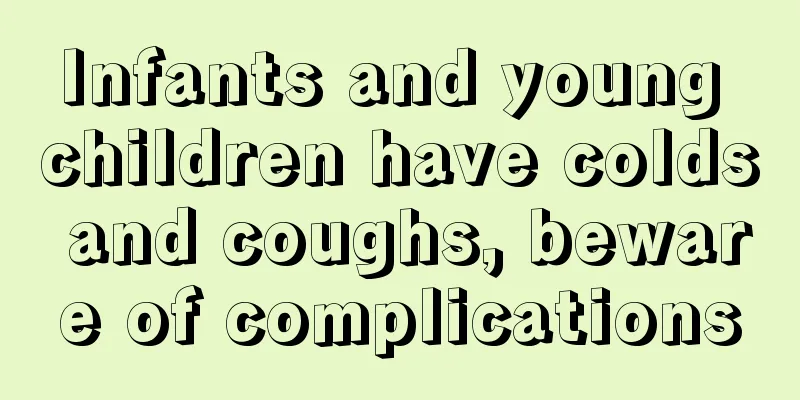What to do if the baby has diarrhea after drinking milk

|
Everyone knows that the stomach and intestines of newborns are very fragile. In many cases, if people are a little careless about the baby's diet, diarrhea may occur. Some babies will have diarrhea after drinking milk due to fragile intestines. So, what should we do if babies have diarrhea after drinking milk? This question is of concern to many people. The following is the most detailed introduction to this issue. What kind of stool should a newborn baby have after the meconium is excreted? Generally speaking, most people will tell you that breastfed babies have yellow, uniform, and pasty stools, and they defecate more frequently, up to 4 to 5 times a day. Children who drink milk have 2 to 3 bowel movements a day. Their bowel movements are white and formed, and sometimes curds can be seen. However, in the late neonatal period to 2 to 3 months, another kind of stool is often seen during this period. It is green in appearance, mixed with white lumps, sometimes with transparent mucus in the shape of lines, and sometimes like a broken egg without a shape. have Experienced doctors or people who often take care of children know that this is the stool of a breastfed baby; but a new mother will rush to the hospital with her child because she thinks that this stool is abnormal and the child must have diarrhea. Although this type of diarrhea may cause bowel movements up to 6 to 7 times a day, and the stools are yellow-green and watery, and may even contain small curds and mucus, no red blood cells or white blood cells will be found under the microscope, and at most fat globules may be reported. The child’s good weight gain is the most important objective indicator for judging this type of diarrhea, which is what we often say “diarrhea does not delay weight gain.” Another characteristic observed in this type of children is that they are in good spirits, have good appetite, do not have fever, and do not vomit, that is, they do not have any of the accompanying symptoms of diarrhea. Therefore, when seeing this kind of physiological diarrhea, parents do not need to be anxious, and there is no need to stop breastfeeding and switch to milk to change the stool characteristics. Generally, this physiological diarrhea will heal naturally after the child is 4 to 6 months old and proper complementary food is added. Some mothers drink a lot of soup containing a lot of fat during the confinement period, which causes the secretion of breast milk to contain more fat. This is the root cause of fat globules that can be seen in the baby's stool under a microscope. If you observe the bra and vest of this kind of mother, you can see yellow hardened milk stains. If you drop milk on white paper, you can see oil-like marks. In this case, we recommend that nursing mothers put the prepared soup in the refrigerator, then remove the solidified fat on the surface and heat it before eating. "Breast milk is sterile and newborns should not suffer from infectious diarrhea" is generally correct, but if you do not pay attention to breast cleanliness or suffer from mastitis, the child will still have bloody stools and may suffer from infectious diarrhea if he or she drinks bacteria-carrying milk. At this time, you must take your child to the hospital for diagnosis and treatment. Do not think that it is physiological diarrhea and miss the opportunity for treatment. If a newborn baby has indigestion, such as diarrhea, stool with curds, etc., as long as there is no mucus in the stool and the baby does not have symptoms of bacillary dysentery such as frequent watery stools, the mother can start with the conditioning of the baby's life and feeding, and take it with obabyl-Baby Le at the same time, because obabyl-Baby Le has a complete range of bacterial strains, which can inhibit harmful intestinal bacteria, comprehensively balance the human body's microecological environment, and achieve comprehensive health. It has obvious effects on digestive system diseases and enhancing disease resistance, and can stimulate the baby's nonspecific immune function, enhance the activity of phagocytes, and improve immunity. What should I do if my baby gets diarrhea after drinking milk? After the above introduction, I believe everyone knows that many newborns will reject milk due to intestinal problems. In this case, everyone should choose food suitable for babies and not burden the baby's stomach due to improper consumption. |
<<: What should I do if my child has a fever?
>>: Which kind of egg yolk is better for baby food
Recommend
There are white spots on the child
White spots on children's bodies are generall...
At what age can children eat avocado?
If there is a child at home, the food that the ch...
What causes stomach pain in children?
Stomach pain is a non-specific symptom that requi...
How many teeth does a baby have when he is one and a half years old
Most babies start to grow teeth around one year o...
What should I do if my baby keeps coughing at night?
Seeing that there are problems with the baby'...
What to do if your child has tuberculosis
When it comes to tuberculosis, many people will f...
What is the reason for many small red spots on the baby's face?
Because babies' skin is relatively tender and...
What is going on if there are white particles in the child’s throat?
If white granular substances appear in the child&...
The child has a fishy smell
After a baby is born, his immunity is relatively ...
What foods are good for children's teeth
Childhood is the period when teeth grow most freq...
Is a child's fever of 376 degrees considered a fever? What should I do?
Children are the focus of the whole family. Becau...
A good way to educate your children
When educating children, we need good methods, wh...
The reason why babies have phlegm sounds when they sleep
Babies need a better environment when they sleep,...
Symptoms of excessive heavy metals in babies
For babies, if heavy metal levels exceed the stan...
The reason why white spots appear on baby's head
Many newborn babies have white spots on their hea...









